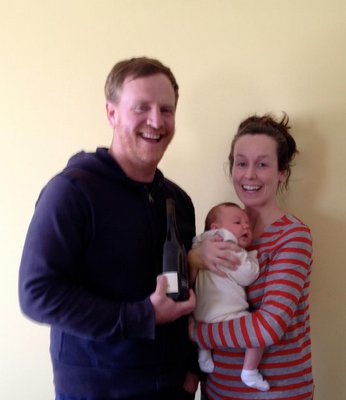
Carey and Regan Meador are devoted to making authentic North Fork wines: wines that are so site-driven and made from such a diverse combination of grape varieties that they can only be replicated here.
But they didn’t begin their careers as East End vintners.
They met in Manhattan and married, both working there in advertising. Although these were coveted jobs, they became disillusioned. At the end of the day, they’d ask each other, “What did you do today?”
“I wrote emails,” said Carey.
“I did a PowerPoint,” said Regan.
And they began to rethink their lives. Creating ideas was not enough. They wanted their ideas to become more tangible.
Regan had grown up on a fourth-generation Texas ranch. But he’d left the farm to work in finance. Then, feeling the constraints of a cubicle, he parlayed his web design skills into a job with the British band Duran Duran, which led him to New York, and more corporate design work. Carey, who was raised on the North Fork, left after school, like most of her friends, for the larger job market in the city.
When Carey and Regan began to consider alternatives to their urban lives, they weren’t sure what they might do. One day in 2011, while visiting Carey’s parents on the North Fork, a small notice by Osprey’s Dominion winemaker Adam Suprenant in the Suffolk Times caught their attention: “Looking for assistant winemaker with little or no experience.”
This opened a new door. “We had no idea if I’d be good at winemaking,” Regan said, “but here was a way to find out.”
The couple didn’t have to cut any ties to the city. Carey could keep working there while Regan stayed with his wife’s family in Southold—not far from the Peconic winery—and worked the harvest.
After a season with Mr. Suprenant, Regan interned with Eric Fry at the Lenz Winery in Peconic. “I learned everything I know from those two,” he said, “and that has made it possible to step away. I didn’t have the baggage of a degree [in enology] … Working with those guys has made me confident.”
Once Regan had some hands-on winemaking under his belt, it was time to figure out a way to make a life of it. He and Carey didn’t just want to make wine for someone else. They wanted to do it all—start a family and follow their own creative urges. They wanted to plant, and prune, and stomp grapes, to ferment varied and new styles of wines.
In 2012, with help from their families, the couple bought a fallow, 23-acre farm with open horizons and a tumbledown house that Carey’s father, Steve O’Connor, helped renovate.
They made their first wines from fruit grown by Rex Farr on Long Island’s only certified organic vineyard, while they turned to the internet to fund their initial planting. In an appeal worthy of this former rock star video-maker, Regan strides across his wildflower-thick acres, with wit and a little sweat, making a plea that netted the new Southold Farm + Cellar a whopping $24,906 from 168 backers—enough to begin planting nine acres of “weird” (read, “not chardonnay or merlot”) varieties, including teroldego, syrah, lagrein and goldmuskateller. Next year, they said they hope to plant seven more acres, this time mixing diverse varieties as field blends.
Carey and Regan aren’t looking to create a corporate brand, they explained. All their wines have different names and labels—“Man the Torpedoes,” “Devil’s Advocate” and “Cast Your Fate to the Wind,” to name a few.
They see their own generation as being “post brand,” they said, constantly seeking the next interesting flavor, whether in craft beers, cocktails, or wines. “We are constantly having to make sure we’re making good stuff,” Regan said. “It’s important to do what you find true. We want to do everything wild.”
“It must be authentic,” Carey added. “We want to be transparent in our winemaking.”
As they submit plans for a wine cellar to the town, their current vintage bubbles away at Raphael’s cellars in Southold, and they have made friends with other young people who are also growing crops and raising animals. “It’s a new community,” Carey said.
Carey and Regan ascribe to this philosophy: “Think about how you can add to the place you come to,” they said. They want to “get past New York’s borders,” with distribution via selective agents who will sell to wine-by-the-glass programs in top restaurants.
“This area deserves more recognition,” Regan said. “It can be world-world-world class!”